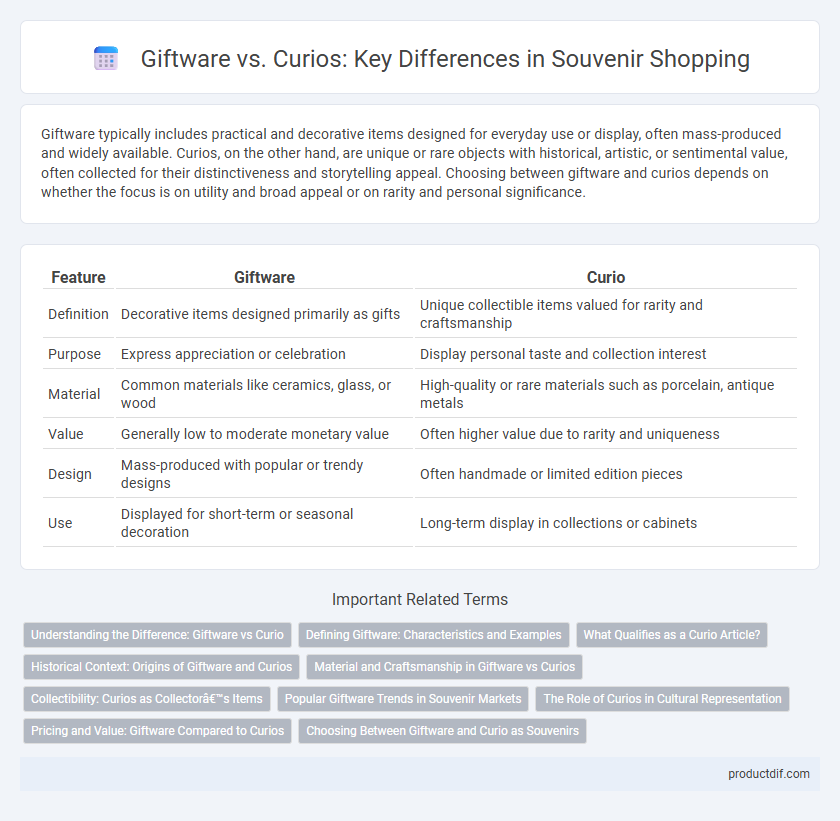Giftware typically includes practical and decorative items designed for everyday use or display, often mass-produced and widely available. Curios, on the other hand, are unique or rare objects with historical, artistic, or sentimental value, often collected for their distinctiveness and storytelling appeal. Choosing between giftware and curios depends on whether the focus is on utility and broad appeal or on rarity and personal significance.
Table of Comparison
| Feature | Giftware | Curio |
|---|---|---|
| Definition | Decorative items designed primarily as gifts | Unique collectible items valued for rarity and craftsmanship |
| Purpose | Express appreciation or celebration | Display personal taste and collection interest |
| Material | Common materials like ceramics, glass, or wood | High-quality or rare materials such as porcelain, antique metals |
| Value | Generally low to moderate monetary value | Often higher value due to rarity and uniqueness |
| Design | Mass-produced with popular or trendy designs | Often handmade or limited edition pieces |
| Use | Displayed for short-term or seasonal decoration | Long-term display in collections or cabinets |
Understanding the Difference: Giftware vs Curio
Giftware typically refers to mass-produced items designed for gifting, such as decorative mugs, photo frames, and keychains, often available in retail stores or online. Curios, on the other hand, are unique or collectible items, sometimes antique or handcrafted, valued for their rarity, history, or cultural significance, often found in specialty shops or antique markets. Understanding the difference helps consumers choose between practical, affordable gifts and meaningful, collectible pieces.
Defining Giftware: Characteristics and Examples
Giftware consists of decorative and functional items designed primarily for gifting, often crafted from materials like glass, ceramics, and metal, and includes products such as photo frames, ornamental vases, and collectible figurines. These items typically emphasize design, brand appeal, and usability, making them suitable for various occasions including birthdays, holidays, and corporate events. Unlike curios, which primarily focus on rarity and uniqueness, giftware balances aesthetics with practical value, appealing broadly to consumers seeking meaningful yet accessible presents.
What Qualifies as a Curio Article?
A curio article qualifies as a small, unusual, or intriguing object often collected for its rarity or aesthetic appeal rather than practical use. Unlike general giftware, which includes a wide range of decorative or functional items intended as presents, curios are typically unique collectibles displayed for their historical, cultural, or artistic significance. These items often evoke curiosity due to their distinctive craftsmanship, origin, or story, setting them apart as prized possessions in a collection.
Historical Context: Origins of Giftware and Curios
Giftware originated during the early 20th century as mass-produced decorative items designed for gifting and home decoration, reflecting industrial advancements and consumer culture growth. Curios trace back to the Renaissance period when collectors sought unique artifacts and exotic items to display as symbols of wealth and knowledge. The historical context highlights giftware's commercial purpose versus curios' emphasis on rarity and historical significance.
Material and Craftsmanship in Giftware vs Curios
Giftware typically features mass-produced items made from materials like ceramic, glass, and metal, emphasizing consistent craftsmanship and polished finishes suitable for decorative or practical use. Curios are often handcrafted with diverse, sometimes rare or organic materials such as wood, bone, or handmade textiles, reflecting unique artisanal techniques and cultural authenticity. The distinction in material choice and craftsmanship highlights giftware's focus on uniformity and durability, while curios prioritize individuality and traditional artistry.
Collectibility: Curios as Collector’s Items
Curios are distinct from general giftware due to their higher collectibility and unique appeal as collector's items. Unlike mass-produced souvenirs, curios often have historical, cultural, or artistic significance that makes them valuable to enthusiasts and collectors. This intrinsic value enhances their desirability and ensures they are preserved as part of personal or museum collections.
Popular Giftware Trends in Souvenir Markets
Popular giftware trends in souvenir markets emphasize personalized and locally-inspired items that resonate with travelers seeking meaningful keepsakes. Eco-friendly materials and handcrafted designs are increasingly favored, reflecting consumer preferences for sustainable and authentic products. Items such as customizable mugs, artisanal jewelry, and region-specific home decor dominate giftware selections, distinguishing them from curios which often serve as collectible or ornamental pieces.
The Role of Curios in Cultural Representation
Curios play a vital role in cultural representation by showcasing authentic artifacts that embody the traditions, history, and artistic expressions of a specific region. Unlike typical giftware, which often emphasizes mass-produced and generic designs, curios offer unique, handcrafted items that reflect the local heritage and storytelling. Collectors and tourists seek curios for their genuine connection to the culture, making them valuable keepsakes that preserve and promote cultural identity.
Pricing and Value: Giftware Compared to Curios
Giftware typically offers a wider price range, from affordable keepsakes to premium collectibles, catering to various budgets and occasions. Curios often hold higher perceived value due to their rarity, uniqueness, and historical significance, commanding premium prices in niche markets. Choosing between giftware and curios depends on buyer preference for cost-effectiveness or investment in distinctive, valuable items.
Choosing Between Giftware and Curio as Souvenirs
Giftware typically serves practical or decorative purposes and includes items like mugs, keychains, and photo frames, making them ideal for everyday use and easy gift-giving. Curios are unique, collectible objects often crafted with cultural or historical significance, appealing to those seeking meaningful and distinctive souvenirs. Choosing between giftware and curio depends on recipient preferences, desired functionality, and the level of sentimental or aesthetic value attached to the souvenir.
Giftware vs Curio Infographic

 productdif.com
productdif.com